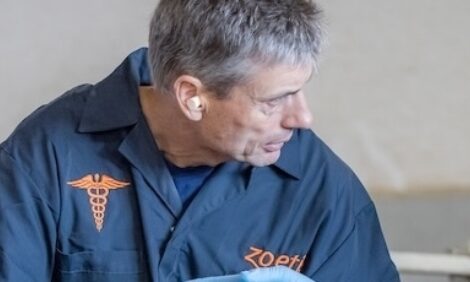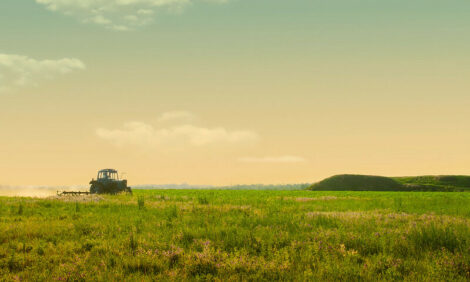



Worrying Trends and New Developments at Agromek
As Christmas approaches, the shops in Denmark are brightly lit, with windows full of traditional red and green decorations, writes Stuart Lumb. Despite the Christmas festivities, sales are sluggish. Shop keepers are gloomy and so are Danish farmers, which is not good for the nation's economy.
"The credit crunch has affected Denmark just like any other country. Pork prices though are forecast to rise in 2009 but not as soon as was forecast, due to the world economic downturn.
As far as exports are concerned the Yen follows the US Dollar which is good for pork exports, however the value of the pound has dropped which is not good news for Denmark.
Production is forecast to drop by six to seven per cent in 2009 and 10-15 per cent of producers will quit the industry.
Producers have to get rid of their sow stalls by 1 January 2013 and this date is looming fast for those producers still with stalls.
Four years may seem a long time but planning applications for new buildings and farm expansion are taking ever longer to process.
This worrying trend was highlighted by Peter Hansen, chairman of the Agromek Exhibition Committee, when he officially opened the Agromek exhibition on 25 Novemver, in the presence of Denmark's Minister of Food, Eva Kjer Hansen.
Many planning applications are taking over two years to process and Mr Hansen stated that a key industry such as farming deserved much fairer treatment.
Mr Hansen added that municipal authorities lack the expertise, manpower and know-how to process these applications, plus municipal authorities interpret the regulations in a non-uniform manner.
A flow of new legislation compounds the problems as well - the government has yet to issue precise regulations concerning Best Available Techniques regarding the reduction of ammonia emissions.
Mr Hansen further highlighted the fact that a small association of less than 1000 members and an annual income of less than £30,000 - the Danish Ecological Council - has the right to appeal against many planning consents, with these appeals taking a further year to be ruled on.
"Legislation and red tape are strangling Danish agriculture and if these anomalies are not sorted out very quickly then agriculture and the Danish economy will be irreparably damaged."
Land prices have dropped by around 20 per cent in Jutland, which is very worrying as the land value is used as collateral for borrowing purposes although the banks do not have cash to lend.
Castration is an increasingly topical issue throughout Europe as the consumer sees this practice as being very painful for the piglet and alternatives are being looked at, in particular in the Netherlands, where pig farmers are anaesthetising piglets with carbon dioxide and oxygen before castration is carried out.
The Danish Ministry of Justice recommended in June this year that Danish producers must use "pain relief " from January 2010 and that in the long term, other strategies must be employed to reduce the risk of boar taint.
Feeding chicory appears to be beneficial, although in the longer term, sexed semen may be the answer. This technique will not be commercially available for another five years.
The Immprovac vaccine used in Australia might be an option but some Danish experts are not keen on this product.
Because slurry disposal is such a problem, many farmers just produce weaners and 6 million are exported to Germany annually, to be finished over the border.
In addition, many farmers are shipping slaughter pigs to Germany as they get a better price than that offered by Danish Crown.
This year, there have been two Agromek shows in Herning, Denmark, which may seem a little strange.
The first one was held as normal in January. However, it suits farmers to buy new machinery at the end of the year and so the machinery companies lobbied to have Agromek held in November rather than in January, hence the show this November.
This time, the show was a mix of livestock equipment and field machinery but the 2009 show will have a major livestock focus with the 2010 show featuring machinery.
DanBred International continue to do well, exporting 40,000 gilts this year, many of these to Russia.
The company has reason to be pleased as it has just come out top in a breeding company comparison trial which took place in Nordrhein-Westfalen, Germany. DanBred stock were compared with those from BHZP, Hulsenberger, JSR, LRS, PIC and Topigs, which are all found on German pig farms.
Friland, which produces organic pork and is part of Danish Crown is not so pleased, as the UK's Waitrose supermarket chain has stopped importing organic pork from Denmark. However, Friland is hoping to now export its organic products to France instead of the UK.
The November show had the usual variety of new products.

Given the concerns about farrowing crates, it was good to see companies continually modifying existing designs. Sdr. Vissing Staldinventar A/S had their 2008 Combisti model on show.
A new design has eliminated the rear crate supports, which means easier access for piglets to teats and hopefully increased milk intake.
There are two creep areas, one on either side of the sow, with a total area of one square metre. Only one creep is used initially. When the piglets are about 10 days old, they are allowed to lie in both creeps.
Technology is being used ever increasingly in the industry and BoPil A/S have used it in their BoPil Pig Finder. With many gestation systems, sows are kept in very large groups and finding individuals is a big headache. This new equipment simplifies the location of sows in big groups plus sows' movements can be tracked and any unusual behaviour is flagged up.
Trimming sow's claws is always a tricky job and Vitfoss were exhibiting a product that makes the job very easy. The FeetFirst® Trimming box measures 2m x 50cm in area and has a false floor. The sow is moved into the box and as it is winched upwards, the sow's legs protrude downwards, so the claws can be easily trimmed. The box can have wheels fitted for ease of movement around the barn.
Not many things are new in our industry though - a UK company called Poldenvale made a similar box 30 years ago, which rotated, turning the sow on her back.
It is a fact of life that pigs become ill and need treatment, with pigs often needing treating on a pen basis. Injecting all the pigs is a time-consuming job and Danish Farm Design A/S has come up with its Medliq® dosing concept as an alternative.

This is used with wet feeding systems, with medication being dispensed automatically from a container fixed to the down tube, with the container being moved from pen to pen, as needed.
Many times it is necessary to inject pigs. Broken needles are a hazard and whilst producers are responsible for ensuring that broken needles are removed before slaughter, some pigs end up being slaughtered with a broken needle still in the carcass. To avoid this problem, Grene A/S has developed its range of TOKU-E needles. These needles have a collar surrounding the needle barrel. In the event of a needle breaking, the collar remains attached to the needle barrel and can be easily seen and removed.
Slurry treatment and application equipment always feature at Agromek and this show was no exception. Slurry used to be considered a nuisance but it is now a power source (biogas) and manure has also become valuable as the price of bag fertiliser has soared.
Injection is used to reduce smell and evaporation but requires powerful equipment and is slow. An alternative system, Biocover, was launched by Thyregod A/S. Between five and 10 per cent of the slurry is treated with sulphuric acid and a foaming agent. This combination is applied over slurry dispensed through another drag hose, acting as a seal. The acid reduces evaporation whilst the foam reduces smell.
December 2008






